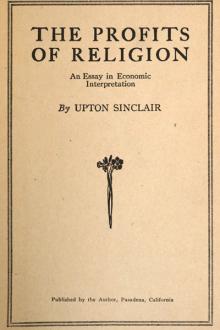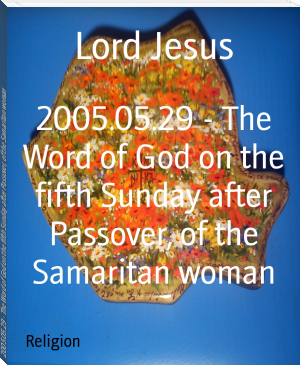The Profits of Religion, Fifth Edition by Upton Sinclair (microsoft ebook reader txt) 📕

- Author: Upton Sinclair
- Performer: -
Book online «The Profits of Religion, Fifth Edition by Upton Sinclair (microsoft ebook reader txt) 📕». Author Upton Sinclair
But the Catholics go on and on; like the patient spider, building and rebuilding his web across a door-way;[107] like soldiers under the command of a ruling class with a "muddling through" tradition—
Theirs not to reason why,
Theirs but to do and die.
And so of course all magnates and managers of industry who have messes to be cleaned up, human garbage-heaps to be carted away quickly and without fuss, turn to the Catholic Church for this service, no matter what their personal religious beliefs or lack of beliefs may be. Somewhere in the neighborhood of every steel-mill, every coal-mine or other place of industrial danger, you will find a Catholic hospital, with its slave-sisters and attendants. Once when I was "muck-raking" near Pittsburgh, I went to one of these places to ask information as to the frequency of industrial accidents and the fate of the victims. The "Mother Superior" received me with a look of polite dismay. "These concerns pay us!" she said. "You must see that as a matter of business it would not do for us to talk about them."
Obey and keep silence: that is the Catholic law. And precisely as it is with the work of nursing and almsgiving, so it is with the work of vote-getting, the elaborate system of policemen and saloon-keepers and ward-heelers which the Catholic machine controls. This industry of vote-getting is a comparatively new one; but the Church has been handling the masses for so many centuries that she quickly learned this new way of "democracy," and has established her supremacy over all rivals. She has the schools for training the children, the confessional for controlling the women; she has the intellectual machinery, the purgatory and the code of slave-ethics. She has the supreme advantage that the rank and file of her [108] mighty host really believe what she teaches; they do not have to listen to table-rappings and flounder through swamps of automatic writings in order to bolster their hope of the survival of personality after death!
So it comes about that our captains of industry and finance have been driven to a more or less reluctant alliance with the Papacy. The Church is here, and her followers are here, before the war several hundred thousand of them pouring into the country every year. It is no longer possible to do without Catholics in America; not merely do ditches have to be dug, roads graded, coal mined, and dishes washed, but franchises have to be granted, tariff-schedules adjusted, juries and courts manipulated, police trained and strikes crushed. Under our native political system, for these purposes millions of votes are needed; and these votes belong to people of a score of nationalities—Irish and German and Italian and French-Canadian and Bohemian and Mexican and Portuguese and Polish and Hungarian. Who but the Catholic Church can handle these polyglot hordes? Who can furnish teachers and editors and politicians familiar with all these languages?
Considering how complex is the service, the price is extremely moderate—the mere actual expenses of the campaign, the cost of red fire and torch-lights, of liquor and newspaper advertisements. The rest may come out of the public till, in the form of exemption from taxation of church buildings and lands, a share of the public funds for charities and schools, the control of the police for saloon-keepers and district leaders, the control of police-courts and magistrates, of municipal administrations and boards of education, of legislatures and governors; with [109] a few higher offices now and then, to flatter our sacred self-esteem, a senator or a justice on the Supreme Court Bench; and on state occasions, to keep up our necessary prestige, some cabinet-members and legislators and justices to attend High Mass, and be blessed in public by Catholic prelates and dignitaries.
You think this is empty rhetoric—you comfortable, easy-going, ultra-cultured Americans? You professors in your classic shades, absorbed in "the passionless pursuit of passionless intelligence"—while the world about you slides down into the pit! You ladies of Good Society, practicing your "sweet little charities," pursuing your "dear little ideals," raising your families of one or two lovely children—while Irish and French-Canadians and Italians and Portuguese and Hungarians are breeding their dozens and scores, and preparing to turn you out of your country!
God's Armor
You remember "Bishop Blougram's Apology," Browning's study of the psychology of a modern Catholic ecclesiastic. He is not unaware of modern thought, this bishop; he is a man of culture, who wants to have beauty about him, to be a "cabin passenger":
There's power in me and will to dominate
Which I must exercise, they hurt me else;
In many ways I need mankind's respect,
Obedience, and the love that's born of fear.
He wishes that he had faith—faith in anything; he understands that faith is all-important—
Enthusiasm's the best thing, I repeat.
But you cannot get faith just by wishing for it—
But paint a fire, it will not therefore burn!
[110] He tries to imagine himself going on a crusade for truth, but he asks what there would be in it for him—
State the facts,
Read the text right, emancipate the world—
The emancipated world enjoys itself
With scarce a thank-you. Blougram told it first
It could not owe a farthing,—not to him
More than St. Paul!
So the bishop goes on with his role, but uneasily conscious of the contempt of intellectual people.
I pine among my million imbeciles
(You think) aware some dozen men of sense
Eye me and know me, whether I believe
In the last winking virgin as I vow,
And am a fool, or disbelieve in her,
And am a knave.
But, as he says, you have to keep a tight hold upon the chain of faith, that is what
Gives all the advantage, makes the difference,
With the rough, purblind mass we seek to rule.
We are their lords, or they are free of us,
Just as we tighten or relax that hold.
So he continues, but not with entire satisfaction, in his role of shepherd to those whom he calls "King Bomba's lazzaroni," and "ragamuffin saints."
I wander into a Catholic bookstore and look to see what Bishop Blougram is doing with his lazzaroni and his ragamuffin saints here in this new country of the far West. It is easy to acquire the information, for the saleswoman is polite and the prices fit my purse. America is going to war, and Catholic boys are being drafted to be trained for battle; so for ten cents I obtain a firmly bound little pamphlet called "God's Armor, a Prayer Book for Soldiers." It is marked "Copyright by [111] the G.R.C. Central-Verein," and bears the "Nihil Obstat" of the "Censor Theolog." and the "Imprimatur" of "Johannes Josephus, Archiepiscopus Sti. Ludovici"—which last you may at first fail to recognize as a well-known city on the Mississippi River. Do you not feel the spell of ancient things, the magic of the past creeping over you, as you read those Latin trade-marks? Such is the Dead Hand, and its cunning, which can make even St. Louis sound mysterious!
In this booklet I get no information as to the commercial causes of war, nor about the part which the clerical vote may have played throughout Europe in supporting military systems. I do not even find anything about the sacred cause of democracy, the resolve of a self-governing people to put an end to feudal rule. Instead I discover a soldier-boy who obeys and keeps silent, and who, in his inmost heart, is in the grip of terrors both of body and soul. Poor, pitiful soldier-boy, marking yourself with crosses, performing genuflexions, mumbling magic formulas in the trenches—how many billions of you have been led out to slaughter by the greeds and ambitions of your religious masters, since first this accursed Antichrist got its grip upon the hearts of men!
I quote from this little book:
Start this day well by lifting up your heart to God. Offer yourself to Him, and beg grace to spend the day without sin. Make the sign of the cross. Most Holy Trinity, Father, Son, and Holy Ghost, behold me in Thy Divine Presence. I adore Thee and give Thee thanks. Grant that all I do this day be for Thy Glory, and for the salvation of my immortal soul.
During the day lift your heart frequently to God. Your prayers need not be long nor read from a book. Learn a few of [112] these short ejaculations by heart and frequently repeat them. They will serve to recall God to your heart and will strengthen you and comfort you.
You remember a while back about the prayer-wheels of the Thibetans. The Catholic religion was founded before the Thibetan, and is less progressive; it does not welcome mechanical devices for saving labor. You have to use your own vocal apparatus to keep yourself from hell; but the process has been made as economical as possible by kindly dispensations of the Pope. Thus, each time that you say "My God and my all," you get fifty days indulgence; the same for "My Jesus, mercy," and the same for "Jesus, my God, I love Thee above all things." For "Jesus, Mary, Joseph," you get three hundred days—which would seem by all odds the best investment of your spare breath.
And then come prayers for all occasions: "Prayer before Battle"; "Prayer for a Happy Death"; "Prayer in Temptation"; "Prayer before and after Meals"; "Prayer when on Guard"; "Prayer before a long March"; "Prayer of Resignation to Death"; "Prayer for Those in their Agony"—I cannot bear to read them, hardly to list them. I remember standing in a cathedral "somewhere in France" during the celebration of some special Big Magic. There was brilliant white light, and a suffocating strange odor, and the thunder of a huge organ, and a clamor of voices, high, clear voices of young boys mounting to heaven, like the hands of men in a pit reaching up, trying to climb over the top of one another. It sent a shudder into the depths of my soul. There is nothing left in the modern world which can carry the mind so far back into the ancient nightmare [113] of anguish and terror which was once the mental life of mankind, as these Roman Catholic incantations with their frantic and ceaseless importunity. They have even brought in the sex-spell; and the poor, frightened soldier-boy, who has perhaps spent the night with a prostitute, now prostrates himself before a holy Woman-being who is lifted high above the shames of the flesh, and who stirs the thrills of awe and affection which his mother brought to him in early childhood. Read over the phrases of this "Litany of the Blessed Virgin":
Holy Mary, Pray for us. Holy Mother of God. Holy Virgin of Virgins. Mother of Christ. Mother of divine grace. Mother most pure. Mother most chaste. Mother inviolate. Mother undefiled. Mother most amiable. Mother most admirable. Mother of good counsel. Mother of our Creator. Mother of our Savior. Virgin most prudent. Virgin most venerable. Virgin most renowned. Virgin most powerful. Virgin most merciful. Virgin most faithful. Mirror of justice. Seat of wisdom. Cause of our joy. Spiritual vessel. Vessel of honor. Singular vessel of devotion. Mystical rose. Tower of David. Tower of ivory. House of gold. Ark of the covenant. Gate of heaven. Morning Star. Health of the sick. Refuge of sinners. Comforter of the afflicted. Help of Christians. Queen of Angels. Queen of





Comments (0)